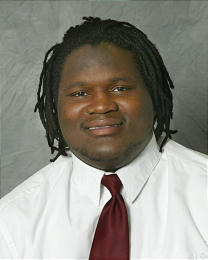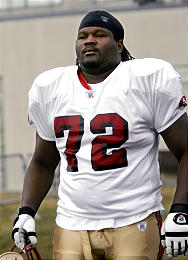August 20, 2005 - Thomas Herrion, 23, San Francisco 49ers OT
 SANTA CLARA, Calif. — San Francisco 49ers offensive lineman Thomas Herrion had heart disease and evidence of previous heart trouble when he collapsed and died after a preseason game last month, an official in the Denver County coroner's office said Tuesday.
SANTA CLARA, Calif. — San Francisco 49ers offensive lineman Thomas Herrion had heart disease and evidence of previous heart trouble when he collapsed and died after a preseason game last month, an official in the Denver County coroner's office said Tuesday.
The coroner's findings confirmed the beliefs of Herrion's family and friends, who were certain drugs played no role in Herrion's death Aug. 20. Herrion's heart condition was caused by factors that are often nearly undetectable, though fairly rare in a 23-year-old athlete in good physical condition.
"It really squashes all the speculation regarding his death," said Frederick Lyles, Herrion's agent. "They appear to be very thorough in their analysis. Hopefully, now people really get off the idea that these guys are overweight, or that drugs or steroids were involved in any way."
Herrion played college football at Utah from 2002-03.
Herrion had ischemic heart disease, with significant blockage in his right coronary artery that caused the death of heart muscle, according to Amy Martin, a forensic pathologist and deputy coroner in Denver. Herrion's heart was slightly enlarged, a condition that could be related to anything from heart disease and high blood pressure to heredity.
Martin also said the autopsy revealed scar tissue from a recent episode in which blood was restricted to his heart — but Herrion probably didn't even realize it.
"From the time that he died, something happened a week or so earlier," said Martin, who found microscopic evidence of organizing heart necrosis.
"Whether he was aware of that was not clear. There are a lot of instances where people have heart attacks and are not aware of them, especially when your job requires you to do things that require you to get hurt. He may not have thought much about it."
Herrion weighed about 335 pounds at the time of his death, Martin said. The 6-foot-3 athlete was roughly comparable in size to dozens of NFL linemen — and the 49ers believe Herrion's cardiovascular fitness was outstanding.
Drug screens on Herrion's blood and urine found only atrophine, a drug administered when medical personnel tried to revive him. There's no indication Herrion's enlarged heart was caused by high blood pressure, Martin said.
Lyles spoke to Herrion's mother after the report was released.
"She's having some roller-coaster days," Lyles said. "She was really happy with the outcome. She's just trying to get some closure, and this will help."
The ebullient lineman, a favorite among his teammates, was on the field for San Francisco's final touchdown drive in a 26-21 loss to Denver, playing exceptionally well and joking with team staff members after it was over.
Players had just finished reciting the Lord's Prayer in the locker room after the game when Herrion collapsed. Though team doctors and medics immediately reached the lineman and took him to the hospital, he couldn't be saved.
"I'm definitely shocked and surprised that someone so young and also in such good shape as Thomas Herrion could have a heart attack," said 49ers offensive lineman Eric Heitmann, one of Herrion's friends. "Thomas passed all the tests at the beginning of the year, and that's what makes this a shock to everybody."
All NFL players receive complete medical exams from their club, including evaluation of their cardiovascular systems, EKG tests, blood tests and chest X-rays, according to the league's collective bargaining agreement. Stress tests are given at the discretion of the clubs' physicians, though the 49ers' medical staff wasn't available to reporters Tuesday.
Herrion repeatedly passed all tests with the 49ers, the club said earlier.
"Our medical experts have not had an opportunity to review the report," NFL spokesman Greg Aiello said. "But based on what we know so far, this may be a case of an unfortunate hereditary condition that is not easily detected, even by the regular and thorough cardiac screening used by NFL clubs. Unfortunately, even young people can be struck without warning by a heart attack."
Herrion, a second-year pro who grew up in Fort Worth, Texas, played two successful college seasons at Utah. He spent part of last season on the San Francisco and Dallas practice squads.
The 49ers held a memorial service in Herrion's honor three days after his death. At his Aug. 27 funeral in Fort Worth, he was remembered as a player who brought joy to everyone.
Herrion's helmet, pads and gear still hang in his locker near the entrance to the 49ers' locker room at their training complex, along with photos of the lineman in action and at play.
"He was always a real healthy kid out there," Heitmann said. "He never missed a snap, never missed a play. I don't remember him ever complaining about fatigue."

 SANTA CLARA, Calif. — San Francisco 49ers offensive lineman Thomas Herrion had heart disease and evidence of previous heart trouble when he collapsed and died after a preseason game last month, an official in the Denver County coroner's office said Tuesday.
SANTA CLARA, Calif. — San Francisco 49ers offensive lineman Thomas Herrion had heart disease and evidence of previous heart trouble when he collapsed and died after a preseason game last month, an official in the Denver County coroner's office said Tuesday.